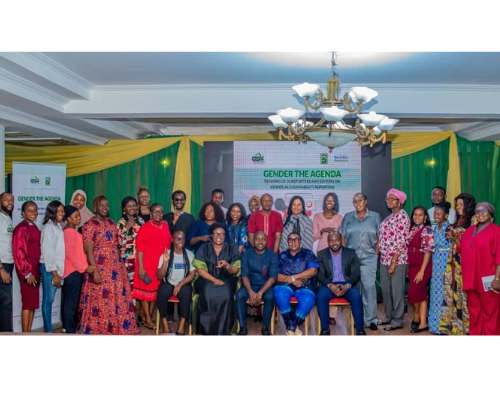
Maureen Okpe
A Non-Governmental Organisation, Gender Strategy Advancement International,GSAI, have advised Journalists on inclusive and non-stereotype reporting to ensure gender accountability and change in the narrative of women representation in sectors of the society.
The Organisation gave the charge recently during a media training in Abuja, organised in collaboration with the MacArthur Foundation and the Wole Soyinka Center for Investigative Journalism,WSCIJ.
Executive Director GSAI, Dr. Adora Onyechere Sydney-Jack, emphasised the need to address accountability gaps in women’s involvement in the economy, politics, and governance, noting previous initiatives targeting gender mainstreaming in government agencies
Speaking on the training, the ED stated that, the initiative is set at promoting gender equality through media discourse, while mainstreaming conversations around women.
She said, “Nigeria, like many other countries, has been grappling with gender disparities, limiting the full potential and contributions of its female population.
“By empowering women, the country stands to benefit from a more diverse and inclusive workforce, increased economic growth, improved societal well-being, and enhanced political representation.
“The national budget went to about 50% Less of gender friendly budget for women, especially in empowerment programmes.
“So we urge the Nigerian policy makers and stakeholders to prioritize gender mainstreaming in policies and programs, allocate resources for women-focused initiatives, and create an enabling environment that supports women’s empowerment.
Project Manager, Centre for Journalism Innovation and Development, CJID, Felicia Dairo, urged Journalist on the use of language that are inclusive of all genders and groups, adding, terminology that are used should be respectful and non-biased as non-stereotype reporting is not just a moral imperative but also a strategic necessity for fostering an inclusive economy.
She said, ”by breaking down stereotypes and promoting inclusion, non-stereotype reporting opens up economic opportunities for marginalised individuals and communities. It encourages businesses to tap into diverse talent pools, reach new markets, and develop products and services that meet the needs of a diverse customer base”.
Dairo further tasked journalists to use reporting as a tool to challenge societal norms and stereotypes.
Also, the Chairman, Nigerian Union of Journalists, FCT Council, Patrick Osadebamwen while highlighting key takeaways from the training noted that journalists play a crucial role in upholding freedom of expression and ensuring accountability in society.
According to Osadebamwen, journalists have a duty to hold governments accountable and promote inclusivity within the society adding that there is a need for journalists to ensure continuous efforts in raising awareness about gaps and shortcomings in governance and social structures.
“As journalists, we have a responsibility to shine a light on government accountability and work towards building a more inclusive society, by reporting on these issues, we can encourage constructive dialogue and facilitate positive change.”
A resource person, Dr. Amaechi Anakwe during his paper presentation titled, “Comparing Nigeria’s Economic and Performance to other countries, evaluating the rot in the system and the role of the media in holding government accountable through sustainable investigative journalism”, emphasized the vital roles journalists play in fostering accountability and transparency in governance.
Dr. Anakwe underlined key responsibilities for journalists and investigative reporters, which encompass probing reports and conducting thorough monitoring and evaluation noting that this serve as essential tools for uncovering systemic issues and holding government entities accountable for their actions.
On her part, Vice President, Nigeria Association for Women Journalists, NAWOJ, Chizoba Ogbeche while delivering her paper on “Media and Gender: Ethics of gender reporting and demystifying negative gender identity towards enhancing women’s political performance” reiterated the importance of ensuring women’s visibility in the media.
She stressed the importance for media practitioners to consistently seek opinions from both women and men in equal measure across all topics stating that this approach ensures balanced representation when choosing news sources and coverage areas.
Head Programme and Marketing, ITV Abuja, Ogar Franca Ada, while explaining the role of community journalism and its place in evaluating the rot in the system encouraged participants to engage with women in remote communities through interviews, providing them with a platform to voice their perspectives.
According to her, this not only fosters community engagement but also serves as a form of corporate social responsibility, allowing journalists to give back to society.
